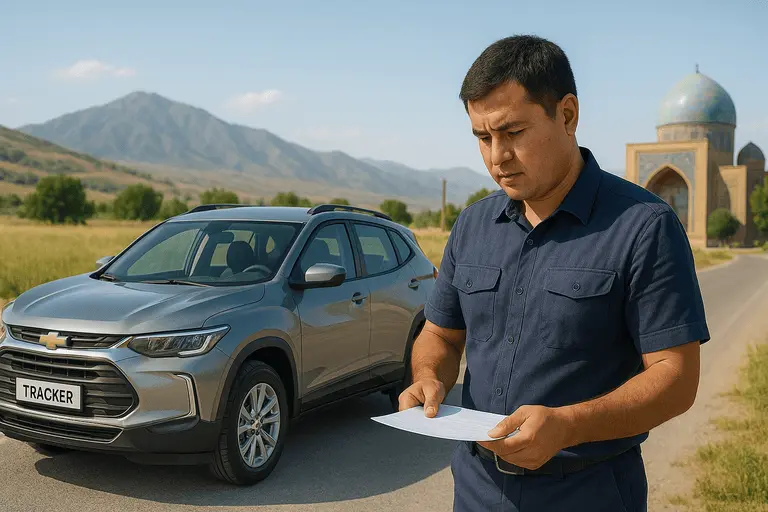
Eighth Winner: Final Weekly Draw of EUROASIA Insurance Winter Giveaway
The eighth and final weekly winner announced! Rahmonov Munirbek won a dash camera and EuroKASKO TOP package.

When purchasing a vehicle—especially for the first time—every car owner faces the question of insurance. In Uzbekistan, the two most well-known types of vehicle insurance are OSAGO and KASKO. But what’s the fundamental difference between them, and which one do you actually need? Understanding how they differ will help you make the right decision and ensure reliable financial protection.
OSAGO (Compulsory Insurance): Mandatory Protection of Your Liability
What is it?
OSAGO is the compulsory insurance of civil liability for vehicle owners. It is a legal requirement for all vehicles operated in Uzbekistan.
What does it cover?
OSAGO does not insure your car—it insures your liability toward third parties. If you cause an accident, your insurance company will compensate the victim for damages to their vehicle, health, or property.
Payout limits:
The payout amounts under OSAGO are strictly regulated by law.
As of 2025, the total coverage is 40 million UZS, including:
up to 14 million UZS for property damage (e.g. repairs to the other party’s car),
up to 26 million UZS for bodily injury or death.
Cost:
The OSAGO policy price is set by government tariffs and depends on vehicle type, region of registration, engine power, and the driver’s age and experience. OSAGO can be purchased online at a relatively low cost.
Requirement:
OSAGO is mandatory by law. Driving without it results in fines.
KASKO: Voluntary Protection for Your Vehicle
What is it?
KASKO is a voluntary form of car insurance. You are not required by law to have it (except when your car is financed through a loan, in which case banks typically require KASKO).
What does it cover?
KASKO protects your own car from a wide range of risks. A standard KASKO policy usually covers:
Damage:
From traffic accidents (even if you’re at fault), natural disasters (hail, storms, floods), fire, falling objects, or vandalism.
Theft:
Full loss of the vehicle due to theft or hijacking.
Payout limits:
The insured amount under KASKO is typically equal to your car’s market value at the time the contract is signed. In case of total loss or theft, you receive a payout close to the car’s value (minus depreciation and any deductible).
Cost:
KASKO is significantly more expensive than OSAGO. Pricing depends on:
the car’s make, model, year, and market value,
selected risk coverage,
deductible size,
presence of anti-theft systems,
the insurer’s own pricing structure.
Requirement:
Not mandatory by law, but strongly recommended for new or expensive vehicles.
Key Differences (Comparison Table)
Criteria | OSAGO (Compulsory) | CASCO (Voluntary) |
|---|---|---|
Requirement | Mandatory by law | Optional (except for financed cars) |
Insurance object | Driver’s liability to third parties | The insured vehicle itself |
Covered risks | Damage to third-party property or health | Damage to your car (accidents, natural events, theft, vandalism) |
Payout if you’re at fault | Payout to the injured third party | Payout to you, even if you’re at fault (depending on the policy) |
Payout limit | Capped by law (40 million UZS) | Market value of the car (minus depreciation/deductible) |
Cost | Relatively low; regulated by the government | Higher; depends on vehicle and policy details |
What Should You Choose: OSAGO, KASKO, or Both?
OSAGO is essential for everyone.
Without it, you are not legally allowed to drive your vehicle.
KASKO is recommended if:
You own a new or high-value vehicle,
Your car is purchased on credit,
You’re a new driver with limited experience,
You often park in unsecured areas,
You want maximum financial protection against a wide range of risks.
Conclusion:
OSAGO and KASKO are not substitutes — they are complementary.
OSAGO protects your finances from third-party claims.
KASKO protects your own vehicle from damage or theft.
For maximum peace of mind—especially if you own a new or valuable car—it is best to have both policies.
Before buying auto insurance, assess your risks and financial capacity, review offers from different insurers (check ratings and terms), and choose the optimal car insurance plan for your needs—whether in Tashkent or elsewhere in Uzbekistan.

The eighth and final weekly winner announced! Rahmonov Munirbek won a dash camera and EuroKASKO TOP package.

EUROASIA INSURANCE delegation joins PVI Insurance's 30th anniversary celebration in Hanoi. Discover how Vietnam's leading insurer achieved $1B revenue milestone and international recognition through digital transformation.

Seventh winner announced on January 19! Combined set: car vacuum + heated seat cover and 2 EuroKASKO modules. Join the Winter Giveaway now!

Discover how to turn your blog into an income source with EUROASIA Insurance affiliate program. Earn up to 20% from each OSAGO, KASKO, and travel insurance sale with no investment or special knowledge required.